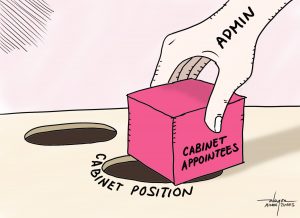BY MICHAEL HENRY LL. YUSINGCO
(MindaNews) — The Philippine Center for Investigative Journalism predicted that about 24 political dynasties were seeking to occupy at least five posts each in the election. According to Dean Julio Teehankee, “If you exceed 4 or 5, that’s already obese. Sobrang taba na. It’s not good for the health of democracy.” It was indeed palpable that in this election cycle, the electorate was bombarded by empirical evidence and scholarly insights demonstrating the malevolence of political dynasties. And it worked, partially at least, in brewing a profound unease in the minds of some voters.
Judging from the results of the senatorial race, it really seems Millennials and Gen Z voters were influenced by an anxiety over the domination of obese political dynasties. This is one of many possible explanations why Bam Aquino and Kiko Pangilinan placed surprisingly high in the final rankings. It can also explain why dynastic senatorial candidates like Erwin Tulfo and Tito Sotto did not place as high as the election surveys suggested. Abby Binay, Ben Tulfo, and Bong Revilla, who were in the survey’s “safe” zone, did not even make it to the winners’ list.
Taking into account the historically high voter turnout rate of 82% and the view that voters may have under-voted in the senate race by 37%, Millennials and Gen Z voters have opened a window here, revealing the possible rescue of our decaying democracy. It appears that a vast majority of Filipinos will repudiate political dynasties when they can. Meaning, if voters had the choice, they would reject dynastic candidates. Millennials and Gen Z voters are in effect posing a challenge to civil society to find ways to channel this angst into sustained political action. For the reality is, the only way to beat fat dynasties is to build something bigger: real people power.
Civil society must rise to the occasion once again to provide meaningful alternative choices for all voters. It must now ignite the furnace to produce genuine political parties. Obviously, not the kind of political parties we have today because most of them are mere shells of political dynasties. We need political parties that will prioritize building a constituency behind policies and principles. Political parties that subordinate the ambitions of select personalities. Political parties that put members and supporters front and center when they pursue their political agenda.
Crucially, however, party-building must be seen as a long game. It relies mainly on the spirit of volunteerism, with political principles as the main driver. The reality is that we will be undertaking this massive project for the first time. And so, we need to start small. For now, as we aim to elevate the political consciousness of Filipinos and diminish the dominance of political dynasties over politics and governance, let us begin with political parties that champion long-term reforms in the following areas of need:
- Food security through modern agriculture and environmental protection.
- Creative economy through culture, media, innovation, and intellectual property rights.
- Blue economy that focuses on maritime security, clean oceans, fisheries, and water management.
The scholarly dissertations tackling these urgent national concerns should not just live in policy papers—they should be permeating amongst actual constituencies. Correspondingly, civil society should encourage organizations to educate communities on these problems and their corresponding solutions. Additionally, these groups should also coordinate activities to influence the government. Needless to say, the end goal is for these groups to evolve into real political parties.
But it is critical that these groups resist depending on only “politainment” to champion their causes. Because it is important for them not to be known as just about showcasing their famous leaders. Indeed, it is vital to first establish a reputation of primarily being centred on offering solutions to our country’s most urgent problems. The focus must not yet be on grooming personalities to run for office, but just to mobilize as many people as possible to force the responsible public officials to institute the necessary reforms.
While Millennials and Gen Z voters have generated excitement within the polity, we need to step on the brakes a little bit. This is not the time to get giddy about 2028 and simply focus on the low-hanging fruit. This will only reinforce personality-based politics and allow dynastic domination to continue. Our mindset now should be on building the foundations for a strong political party culture. This is the best way to cultivate the agitation that millennials and Gen Z voters have instigated against obese political dynasties.
Let’s face it: this fight against political dynasties will not be won in 2028. Or in 2031. Maybe not even in 2034. But we have to start beefing up our political muscles now. Because if we do not, then the future of our politics and governance is clear—more dynasties, more corruption, more hopelessness. So yes, we must vote. But more importantly, we must organize. Millennials and Gen Z voters are just waiting for the call.
(MindaViews is the opinion section of MindaNews. Michael Henry Yusingco, LL.M is a law lecturer, policy analyst, and constitutionalist.)

